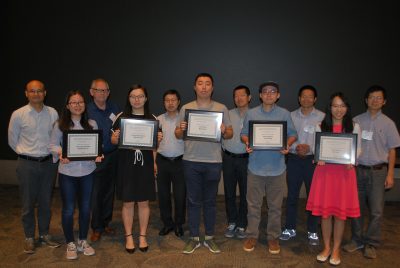Dr. Kun Chen and Dr. Dingfeng Jiang offered a short course titled “Integrative Multivariate Statistical Learning in Healthcare Research with Real-World Data” on April 25 at the 2017 ICSA Applied Statistical Symposium, Chicago, IL. The course was designed to bridge the academic research and industrial practice on utilizing real-work data. The course was well attended by researchers from both academia and industry.
Abstract
This short course starts with an overview of recent problems arising from healthcare studies with large-scale heterogeneous data; examples include pragmatic trial, drug development, outcome research, suicide prevention, and opioid abuse. In these problems, a common scheme is that measurements of several distinct yet interrelated characteristics pertaining to a single set of subjects are collected from an array of disparate sources. For example, individual health data may come from insurance claims, pharmacy visits, clinical records, patient surveys, and government statistics. The availability of such complex data makes tackling many scientific and practical problems possible through “integrative statistical learning”, which is undergone exciting development and is pushing for a refinement of the conventional multivariate learning toolkit. In this short course, several classes of multivariate learning techniques for simultaneous dimension reduction, feature selection and model estimation will be introduced, together with discussions of several practical case studies in healthcare. The course consists of 4 modules: 1) overview of problems and statistical challenges in healthcare studies with big data; 2) integrative multivariate data reduction techniques with case studies; 3) integrative predictive modeling techniques with case studies; 4) recent developments on multi-view data fusion. The participants will have the opportunity to go through examples using newly developed R packages.
Instructor Bio:
Dr. Kun Chen is an Assistant Professor in the Department of Statistics, University of Connecticut (UConn), and a Research Fellow at the Center for Public Health and Health Policy, UConn Health Center. Chen’s research interests include multivariate statistical learning, high-dimensional statistics, and health informatics with large-scale heterogeneous data. He has extensive interdisciplinary research experience in a variety of fields including insurance, ecology, biology, agriculture, medical imaging, and public health. Chen’s research projects have received funding from the National Institutes of Health, the Simons Foundation, the National Science Foundation, etc. Currently he is involved in a data-driven suicide prevention study through integrating big data from disparate sources. Chen was a Co-Editor of the 2015 ICSA Symposium Proceeding Book, and serves as an Associate Editor of Sankhya: The Indian Journal of Statistics since 2016. He was recognized for Teaching Excellence at UConn for multiple times.
Dr. Dingfeng Jiang is a statistical manager at AbbVie Inc. Jiang’s research interest include high-dimensional statistics, variable selection, and causal inference in observational studies. He has extensive research experience in designing observational outcome research using big healthcare data, with application in diabetes, oncology and immunology therapy areas. He has served as reviewers for multiple statistical journals. He is an editorial board member for Heliyon, an open access journal published by Elsevier.
